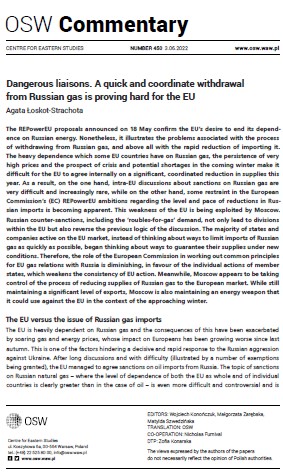Dangerous liaisons. A quick and coordinate withdrawal from Russian gas is proving hard for the EU
Dangerous liaisons. A quick and coordinate withdrawal from Russian gas is proving hard for the EU
Author(s): Agata Loskot-Strachota
Subject(s): Energy and Environmental Studies, Environmental and Energy policy, Government/Political systems, International relations/trade, Political behavior, EU-Approach / EU-Accession / EU-Development, Peace and Conflict Studies, Russian Aggression against Ukraine
Published by: OSW Ośrodek Studiów Wschodnich im. Marka Karpia
Keywords: REPowerEU; Russian gas imports; Russian gas supplies to the EU; Russian counter-sanctions;
Summary/Abstract: The REPowerEU proposals announced on 18 May confirm the EU’s desire to end its dependence on Russian energy. Nonetheless, it illustrates the problems associated with the process of withdrawing from Russian gas, and above all with the rapid reduction of importing it. The heavy dependence which some EU countries have on Russian gas, the persistence of very high prices and the prospect of crisis and potential shortages in the coming winter make it difficult for the EU to agree internally on a significant, coordinated reduction in supplies this year. As a result, on the one hand, intra-EU discussions about sanctions on Russian gas are very difficult and increasingly rare, while on the other hand, some restraint in the European Commission’s (EC) REPowerEU ambitions regarding the level and pace of reductions in Russian imports is becoming apparent. This weakness of the EU is being exploited by Moscow. Russian counter-sanctions, including the ‘roubles-for-gas’ demand, not only lead to divisions within the EU but also reverse the previous logic of the discussion. The majority of states and companies active on the EU market, instead of thinking about ways to limit imports of Russian gas as quickly as possible, began thinking about ways to guarantee their supplies under new conditions. Therefore, the role of the European Commission in working out common principles for EU gas relations with Russia is diminishing, in favour of the individual actions of member states, which weakens the consistency of EU action. Meanwhile, Moscow appears to be taking control of the process of reducing supplies of Russian gas to the European market. While still maintaining a significant level of exports, Moscow is also maintaining an energy weapon that it could use against the EU in the context of the approaching winter.
Series: OSW Commentary
- Page Count: 7
- Publication Year: 2022
- Language: English
- Content File-PDF

